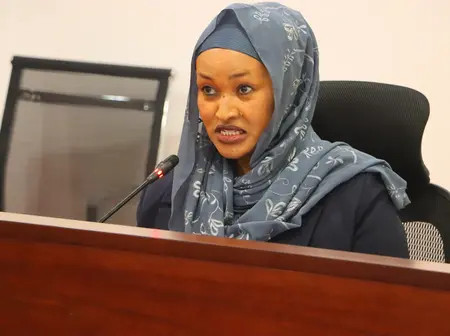The National Assembly Committee on Cohesion and Equal Opportunities has questioned National Lands Commission CEO, Kabale Arero, over claims that she favoured members of her Borana community during recruitment at the expense of other marginalized groups.
During a session chaired by Wajir South MP Adan Yussuf Haji, committee members accused Arero of using her previous role as Acting Human Resource Manager to influence hiring in favour of the Borana community.
Mwingi North MP Paul Nzengu and other lawmakers suggested that Arero ensured most employment slots meant for marginalized groups went to those from her ethnic background.
Kisumu Central MP Dr. Joshua Oron pressed her, asking: “How long did you serve as HR manager?” “I served in an acting capacity for five years before becoming CEO,” Arero replied. Dr. Oron then remarked, “That explains why the Boranas got a giant share.”
Chairman Haji said the Committee was concerned that heads of state agencies often influence staff recruitment to favour their own communities. “We are not opposed to Boranas being employed, but other communities also deserve equal opportunity,” he said.
Arero faced further scrutiny after admitting that only 1 percent of NLC staff are persons living with disabilities (PLWDs)—just seven individuals out of 628 employees. MPs termed this a blatant violation of the law on inclusion.
“This is discrimination of the highest order,” said Dr. Oron. Nakuru Woman Rep Liza Chelule dismissed Arero’s explanation that few PLWDs apply for advertised jobs.
“You should work with MPs’ offices and the National Council for PLWDs to identify qualified candidates. They have the data,” Chelule said.
Arero denied ethnic bias and promised that future recruitment will be more inclusive. The Committee, however, urged her to urgently address the gaps in ethnic diversity and disabled representation.
In a separate session chaired by Nyeri Town MP Duncan Mathenge, Garissa University Vice Chancellor Prof. Ahmed Osman Warfa was also questioned over ethnic imbalance in staff recruitment. MPs noted that most university employees were from the Somali community.
Prof. Warfa said other Kenyans were reluctant to apply due to security fears after the 2015 Al-Shabaab attack on the institution. But the Committee dismissed this reason, saying security in the region has since improved.

Leave a Reply